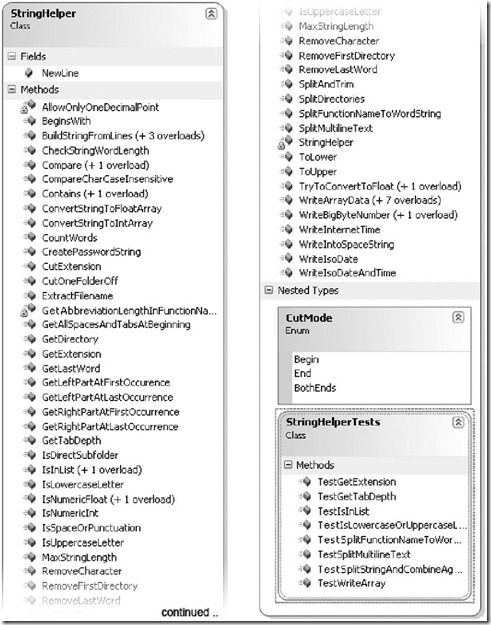辅助类——StringHelper类
StringHelper类
StringHelper类是最大的辅助类之一,估计它是我曾写的第一个辅助类,因为处理字符串会卷入如此之多的问题,很容易就可以想到许多方式来改善性能,更容易地处理字符串列表,输出字符串数据等等。
如果看一看StringHelper类(如图3-9所示),您会立刻发现许多方法,并且所有重载的方法支持很多不同的参数类型。它还包含相当多的单元测试;几分钟前,您就看见过一个来自于StringHelper类的单元测试。
您可能自言自语,为什么这个类中的单元测试那么少,而方法却如此之多。这是因为很多年前我就开始写这个类了,远在我开始使用单元测试之前。其中有些方法在.Net 2.0 中没有太大的意义了,因为现在Framework实现了它们,不过我还是习惯于自己的方法。我只是希望你能在这个类中找到某些有用的方法。可能要花一些时间来习惯这么多方法,不过当您需要进行一项复杂的字符串操作时,您将会因为这个有用的方法感谢我(如果您有自己的辅助类,就是您自己)。
提取文件名
在System.IO命名空间的Path类中,也包含许多诸如GetDirectory、CutExtension等等的方法,不过在StringHelper类中用来处理文件名的最有用的方法之一就是ExtractFilename方法,它把路径和扩展名都去掉了,只得到文件名,再无其他。
Path.GetFileNameWithoutExtension方法做类似的一件事,不过出于某些原因我更喜欢自己的方法。如果您想实现自己的方法,并且需要一些能着手工作的代码,也可能很有趣。再强调一次:您不是必须写自己的Path方法,不过有时您不知道Framwork提供了这些,或者您只是想自己去研究一下。
自从我测试这些方法的性能以来已经过了很久,不过我还是认为大多数StringHelper类的方法比某些Path类的方法更快。
/// <summary>
/// Extracts filename from full path+filename, cuts of extension
/// if cutExtension is true. Can be also used to cut of directories
/// from a path (only last one will remain).
/// </summary>
static public string ExtractFilename(string pathFile, bool cutExtension)
{
if (pathFile == null)
return "";
// Support windows and unix slashes
string[] fileName = pathFile.Split(new char[] { '\\', '/' });
if (fileName.Length == 0)
{
if (cutExtension)
return CutExtension(pathFile);
return pathFile;
} // if (fileName.Length)
if (cutExtension)
return CutExtension(fileName[fileName.Length - 1]);
return fileName[fileName.Length - 1];
} // ExtractFilename(pathFile, cutExtension)
Writing a unit test for a method like this is also very simple. Just check if the expected result is returned:
Assert.AreEqual("SomeFile",
StringHelper.ExtractFilename("SomeDir\\SomeFile.bmp"));
输出列表
在StringHelper类中另一个比较独特的是WriteArrayData方法,它把任何类型的列表、数组或者IEnumerable数据书写为文本字符串,这些字符串可以被写入日志文件中。实现还是非常简单:
/// <summary>
/// Returns a string with the array data, ArrayList version.
/// </summary>
static public string WriteArrayData(ArrayList array)
{
StringBuilder ret = new StringBuilder();
if (array != null)
foreach (object obj in array)
ret.Append((ret.Length == 0 ? "" : ", ") +
obj.ToString());
return ret.ToString();
} // WriteArrayData(array)
列表,甚至泛型列表都是从ArrayList类继承来的,所以能够给这个方法传递任何动态列表。对于存在特殊重载版本的Array数组、特殊的集合、byte和integer数组,这些以IEnumerable接口工作的类型也都存在对应的重载版本,不过使用非object类型的重载速度会更快。
可以编写下列代码来测试WriteArrayData方法:
/// <summary>
/// Test WriteArrayData
/// </summary>
[Test]
public void TestWriteArrayData()
{
Assert.AreEqual("3, 5, 10",
WriteArrayData(new int[] { 3, 5, 10 }));
Assert.AreEqual("one, after, another",
WriteArrayData(new string[] { "one", "after", "another" }));
List<string> genericList = new List<string>();
genericList.Add("whats");
genericList.AddRange(new string[] { "going", "on" });
Assert.AreEqual("whats, going, on",
WriteArrayData(genericList));
} // TestWriteArray()
